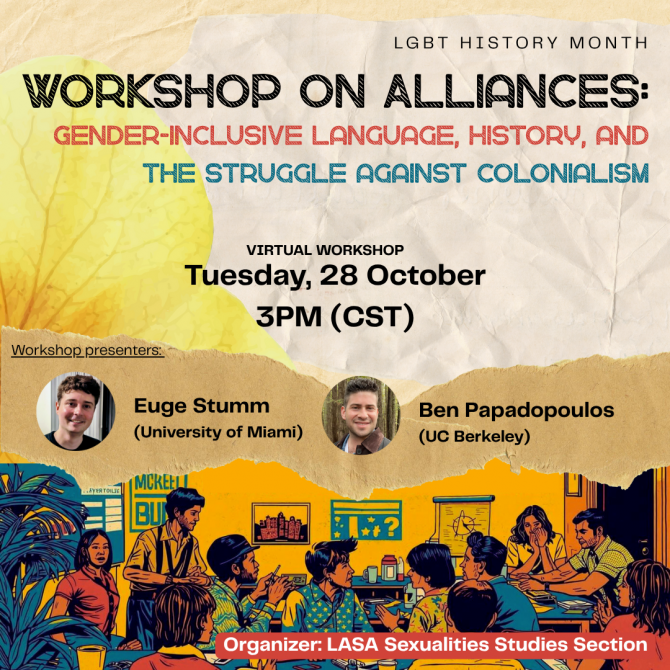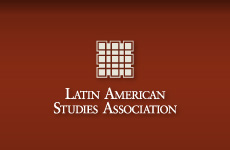News & Notes
Workshop on Alliances: Gender-Inclusive Language, History, and the Struggle against Colonialism
Oct 28, 2025 | Personal and Professional Notes

As part of the new board's and chair's goals for this section, and in light of the importance of LGBT History Month, we are pleased to present the first in what we hope will be a long series of events promoted and organised by the Sexuality Studies Section of the Latin American Studies Association. This workshop about non-binary language and the struggle against colonialism is made possible by the awesome collaboration of Euge Stumm and Ben Papadopoulos. We are pleased to share the following information with all our members:
Workshop on Alliances: Gender-Inclusive Language, History, and the Struggle against Colonialism
The question that motivates this workshop is as follows: How can we frame the use of gender-inclusive Spanish as an alliance of both inclusivity and decoloniality considering the history of colonialism in Latin America that has permeated our relationships and identities? Our hypothesis is that the conditions of possibility for conceiving of gender-inclusive language have existed in Latin America since colonial times and they reflect a broader exercise of solidarity and allyship. Recent research (e.g. Reales Gil, 2020) has demonstrated predominantly negative attitudes towards the use of gender-inclusive language in Argentina, Mexico, and Spain. This workshop is a response to the idea that gender-inclusive language is an imposition from outside the Spanish-speaking world by demonstrating that instead or in addition, it is produced by Hispanic gender and sexual dissidents and allies as a form of resistance to colonialism. The new grammar that has emerged is itself an alliance between these disenfranchised groups, who have reimagined the constraints placed upon them by modifying the grammar of the imperial Spanish language. Following an interactive fashion, we will overview the Digital Humanities project Gender Inclusive Spanish Digital Archive. This project provides participants with interactive temporal and spatial visualizations of Spanish-speaking cultural productions featuring linguistic dissidence ranging from colonial to contemporary times. Our primary resources include art, zines, poetry, theses, manifestos, short stories, novels, and videos. First, we set the stage by interrogating cultural productions from the colonial era to understand the choque cultural and forms of dominance imposed in colonialism that created the rigidly binary system of gender in Latin America today. Namely, we document early installations of this binary worldview by colonizers that precipitated the insurgence of gender and sexual dissidents in Latin America and that contextualize the intersectionality between the struggle of gender and sexual dissents and colonial violence. Then, we analyze contemporary cultural productions that implement gender-inclusive Spanish through the use of neomorphemes (e.g. “x,” “e,” etc) to draw on how these cultural manifestations express a loose alliance. Taking up Audre Lorde’s argument that there is no hierarchy of oppression, we argue that these gender and sexual dissidents have resisted gender binarism as a direct confrontation to the coloniality of power.
Workshop presenters: Euge Stumm and Ben Papadopoulos
Euge Stumm (they/them/elle/elu) is a Dean's Fellow and Ph.D. student in Literary, Cultural, and Linguistic Studies in the Department of Modern Languages and Literatures at the University of Miami. Their research examines how gender and sexual dissidents in Latin America construct language to express their experiences. Their research corpus focuses on cultural productions utilizing inclusive language and non-binary Spanish in Argentina, and Pajubá, a cryptolect originally developed by travesti sex workers, in Brazil. Currently, they are developing an open-access Pajubá Digital Archive, gathering multiple resources, dictionaries, and scholarly works on the cryptolect.
Ben Papadopoulos (he/they/él/elle) is a recent Ph.D graduate in Hispanic Languages and Literatures from the University of California, Berkeley. He is primarily interested in the fields of sociolinguistics and critical sociology. His research revolves around the topic of gender-inclusive language and makes sociological arguments about language as a category of power and the right of queer and trans people to have and use adequate forms of self-identification. Relatedly, he is the founder of the Gender in Language Project (genderinlanguage.com), which aims to offer grammars of gender in as many languages as possible.
To attend, please register: https://www.eventbrite.com/e/gender-inclusive-language-history-and-the-struggle-against-colonialism-tickets-1811037504929
